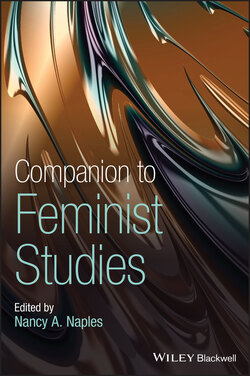Читать книгу Companion to Feminist Studies - Группа авторов - Страница 68
British Materialist Feminism
ОглавлениеIn 1978 – the year before Barrett and McIntosh's article was published in the inaugural issue of Feminist Review, appeared an anthology coedited by Annette Kuhn and AnnMarie Wolpe, titled Feminism and Materialism: Wonen and Modes of Production (Kuhn and Wolpe 2013a). Kuhn and Wolpe's introduction makes some remarkably similar points to Delphy's, even though the framework in which they position themselves is vastly different to the French one. Kuhn and Wolpe situate their discussion at the moment of the entry of women's studies into institutions of higher learning. At the time they were writing, however, most women's studies courses were being run outside formal educational institutions, or if within them, they were strands within more traditional disciplines. According to Lisa Downing, the first university women's studies course to be so named in the UK was an MA in Women's Studies at the University of Kent, set up in 1980 (Downing 2013, online).
Kuhn and Wolpe raised the problem that is now familiar to many feminists both within and outside the academy: that of the tension between ghettoization and cooptation. They also, in notable parallel to Delphy, raised the problem of elitism of institutions of knowledge production and the siloing of knowledge and theory into the ivory towers of disciplines, within which “appropriate modes of inquiry, limits and boundaries of ‘subjects’, methods, ways of producing and making use of knowledge, are defined” (Kuhn and Wolpe 2013b). They termed this elitist approach to theory production, and to authoritative knowledge claims, “theoreticism,” and contrasted it with the location of feminist theory production in the need to address the oppression of women. They argued for more of that feminist theory production, which arises “quite simply from the very urgent and specific need for constructing an analytical and effectual understanding of women's situation” (Kuhn and Wolpe 2013b). The particular theoretical contribution they argue for is materialism.
However, their starting point for understanding materialism, which draws on Engels' definition, is framed a little differently from Delphy's. For them, “the materialist problematic is based on a conceptualization of human society as defined specifically by its productivity: primarily of the means of subsistence and of value by the transformation of nature through work.” Even if they seem to begin at quite a similar starting point to Delphy – that of analyzing the position of women in terms of relations of production and reproduction as constituted through history – they quickly resituate their materialism within a socialist‐feminist dual systems framework of sexual division of labor in the private sphere and social relations between capital and waged labor in the public sphere. Although trenchantly critical of Marxism's failure to either theorize or address the subordination of women, Kuhn and Wolpe nonetheless explicitly situate their materialist analysis as, at least to some extent, “an attempt to transform Marxism.” The question is thus begged of the difference between this British materialist feminism and socialist feminism. Indeed, Kuhn and Wolpe appear to reinforce a “dual systems” conceptualization in stating that:
a materialist approach to the question of women's situation constantly comes up against the problem of the apparently transhistorical character of women's oppression, which immediately problematizes the relationship between such oppression and mode of production. Any attempt to deal with this fundamental issue necessitates a consideration of the relationship between patriarchy, however formulated, and history; or more particularly, mode of production. In this context two interrelated issues are raised – the family and the sexual division of labour – whose crucial importance to the theorization of the situation of women is constantly claimed but still remains to be analysed.
(Kuhn and Wolpe 2013b)
Kuhn and Wolpe thus remain within a Marxian conceptualization of “mode of production” as being exclusively tied to the development of capitalism, and appear either to not be aware of radical and French materialist analyses of the family and sexual division of labor, or to consider such analyses unimportant. The rest of the contributions to the anthology remain within the “dual systems” framework: the family/patriarchy and the capitalist state, but without positing the family mode of production as distinctive.
By the end of the 1980s, then, two fundamentally different conceptualizations of materialist feminism had emerged on different sides of the English Channel: the French, which is politically and theoretically closer to the radical feminism of the Anglo world, although it gives a greater importance to materialism as method, and the British, which would appear to be the intellectual counterpart to socialist feminism.
